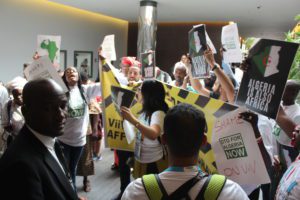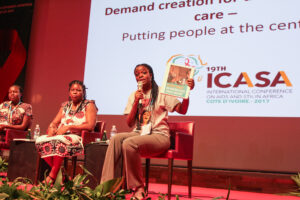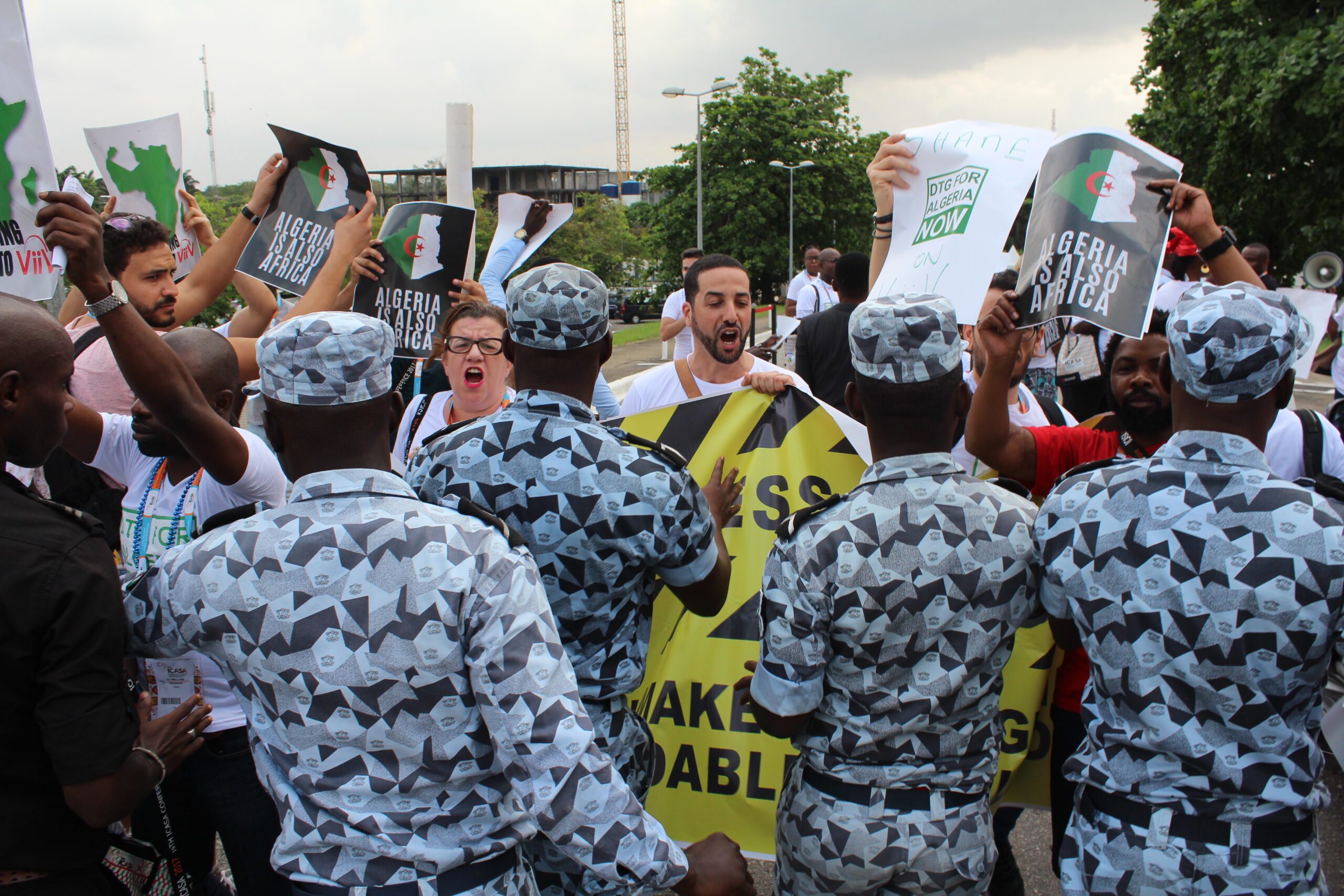ABIDJAN, Côte d’Ivoire. December 8, 2017—A global network of activists is calling on pharmaceutical company ViiV Healthcare to allow people living with the human immunodeficiency virus (HIV) in Algeria to get more affordable access to treatment in that country.
Activists representing several advocacy groups recently staged a high-profile protest demanding that ViiV Healthcare give people living with HIV in Algeria access to an HIV drug called dolutegravir, by allowing generic versions of the drug to be made.
At present, the licensing terms held by ViiV Healthcare, the patent holder, allow generic versions of the drug to be manufactured in all African countries except Algeria. Excluding Algeria from the voluntary licensing deal means the company can limit competition and keep drug prices high in that country.
“Algeria is Africa, Africa is Algeria. There is no reason to differentiate us,” said Othoman Mellouk, Intellectual Property and Access to Medicines Lead at the International Treatment Preparedness Coalition (ITPC), a global activist network, which led the recent protest.
 “ViiV Healthcare has failed to ensure all people in need of the drug are able to access it. While we continue to lobby them on this issue, ITPC is also inviting the government of Algeria to issue a compulsory license on the HIV drug dolutegravir, in order to ensure that people living with HIV in Algeria get essential treatment. ITPC calls on all governments to use their right to act in the interest of public health to ensure no-one is left behind.”
“ViiV Healthcare has failed to ensure all people in need of the drug are able to access it. While we continue to lobby them on this issue, ITPC is also inviting the government of Algeria to issue a compulsory license on the HIV drug dolutegravir, in order to ensure that people living with HIV in Algeria get essential treatment. ITPC calls on all governments to use their right to act in the interest of public health to ensure no-one is left behind.”
Solange Baptiste, executive director of the ITPC, said that activists had been discussing the issue with ViiV Healthcare for more than two years without coming to terms.
“The human toll of this delay is unacceptable. Affordable access is a humanitarian necessity and our collective responsibility,” she said.
The jointly staged, ITPC-led protest action took place on the second day of the 19th International Conference on AIDS and STIs in Africa (ICASA), held at the Sofitel Hotel in Abidjan, Côte d’Ivoire, from December 4 to 9.
Treatment access cost and other financial issues dominated discussions at the regional conference. Organisers described the gathering as an opportunity to draw the world’s attention to the fact that the global economic downturn was threatening to reverse important gains made in HIV prevention, care and treatment.
“In order to eradicate HIV, we have to put a spotlight on treatment access issues. We must stay fully engaged. Health is a human right, and the elimination of AIDS is a basic duty,“ said Raymonde Goudou Coffie, the Côte d’Ivoire Minister of Health and Public Safety, who was among several dignitaries in attendance.
The minister’s words highlighted the high cost of medication across the region, a reality that prevents millions from accessing optimal HIV services.
“Only one in four people living with HIV in West Africa is getting the treatment they need,” said Alain Manouan, who moderated the final plenary of the conference, a session focused on domestic financing. “The sustainability of the HIV response will not be possible if more funding do not come from beneficiary countries themselves.”
The session was organised by ITPC and the Global Fund, a partnership that invests nearly US$4 billion a year to support programs accelerating the end of AIDS, tuberculosis and malaria as epidemics.
Mr. Manouan directs ITPC’s region-wide project to increase access to optimal HIV treatment in 11 countries—Benin, Côte d’Ivoire, the Gambia, Ghana, Guinea, Guinea-Bissau, Liberia, Mali, Senegal, Sierra Leone, and Togo.
Better affordability is just one of several changes needed to empower people living with HIV to get access to the treatment options that suit them best. Stigma and discrimination, lack of knowledge and awareness, and procurement failures also hinder global efforts to increase access.
In response, a growing number of countries are putting supportive policies in place for a relatively new approach to treatment, called differentiated care or differentiated service delivery (DSD). This client-centred approach simplifies HIV services, so that health systems carry less burden and people living with HIV find that their needs are better served.
 A new DSD toolkit was launched in a satellite session on the conference opening day. The toolkit was developed by ITPC and the AIDS and Rights Alliance of Southern Africa (ARASA), in collaboration with the International AIDS Society (IAS).
A new DSD toolkit was launched in a satellite session on the conference opening day. The toolkit was developed by ITPC and the AIDS and Rights Alliance of Southern Africa (ARASA), in collaboration with the International AIDS Society (IAS).
“This new toolkit enables communities to demand recipient-centred models of differentiated care, most specifically differentiated antiretroviral therapy delivery,” said Anna Grimsrud, the lead technical advisor for HIV Programmes at IAS.
ICASA 2017 Reminds Us That the Fight for Optimal HIV Treatment is Far From Over
Posted on
by
